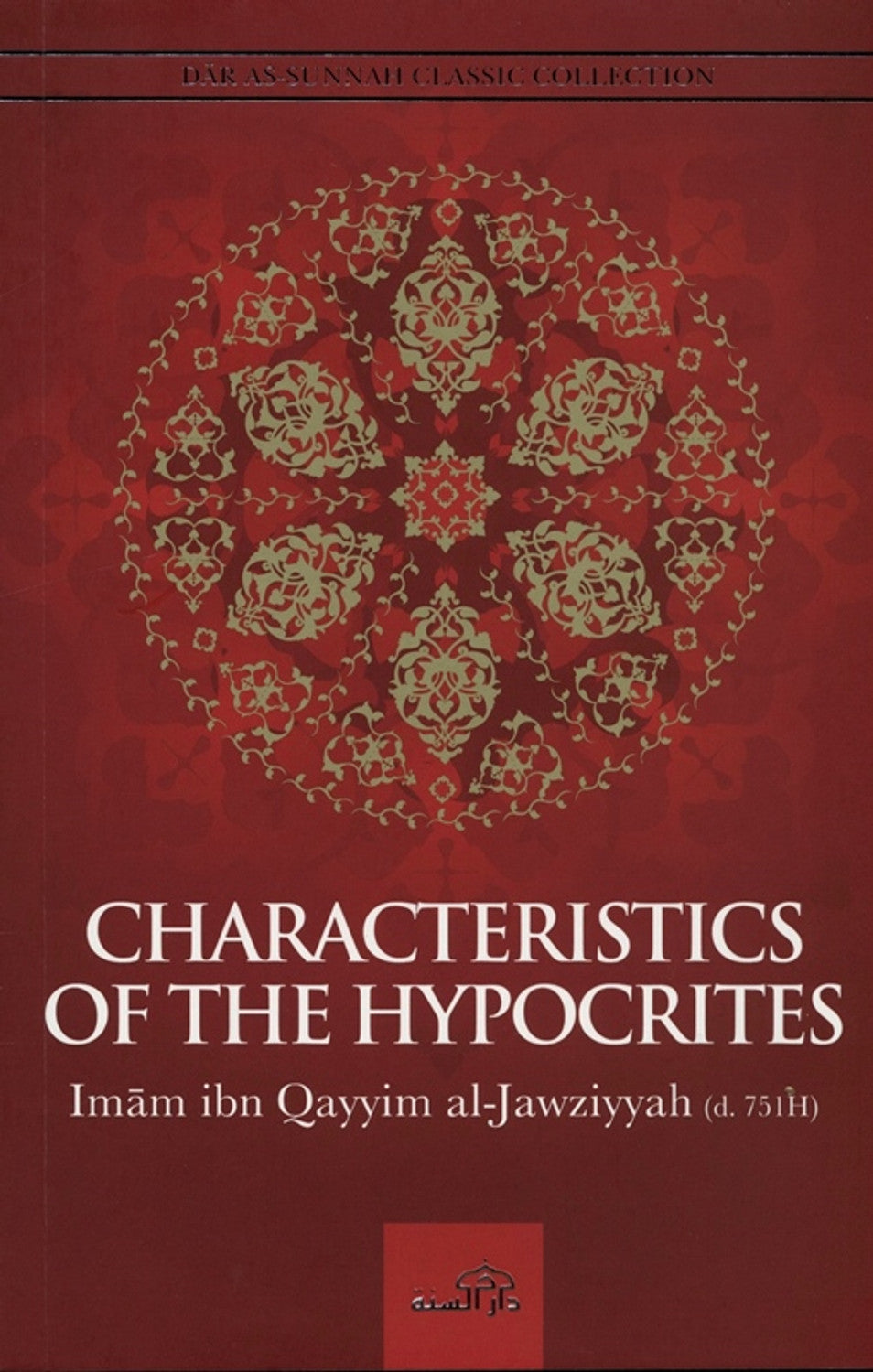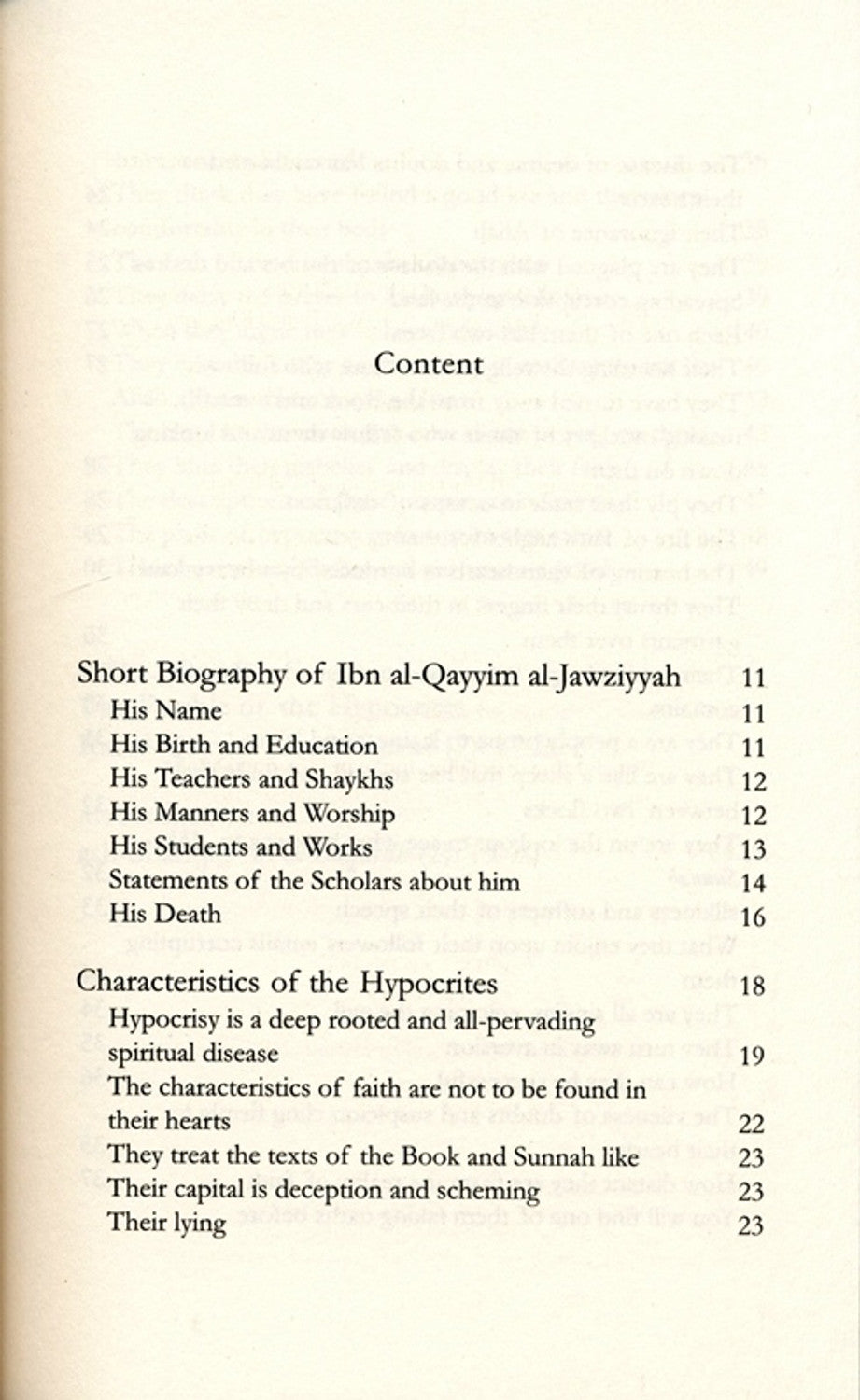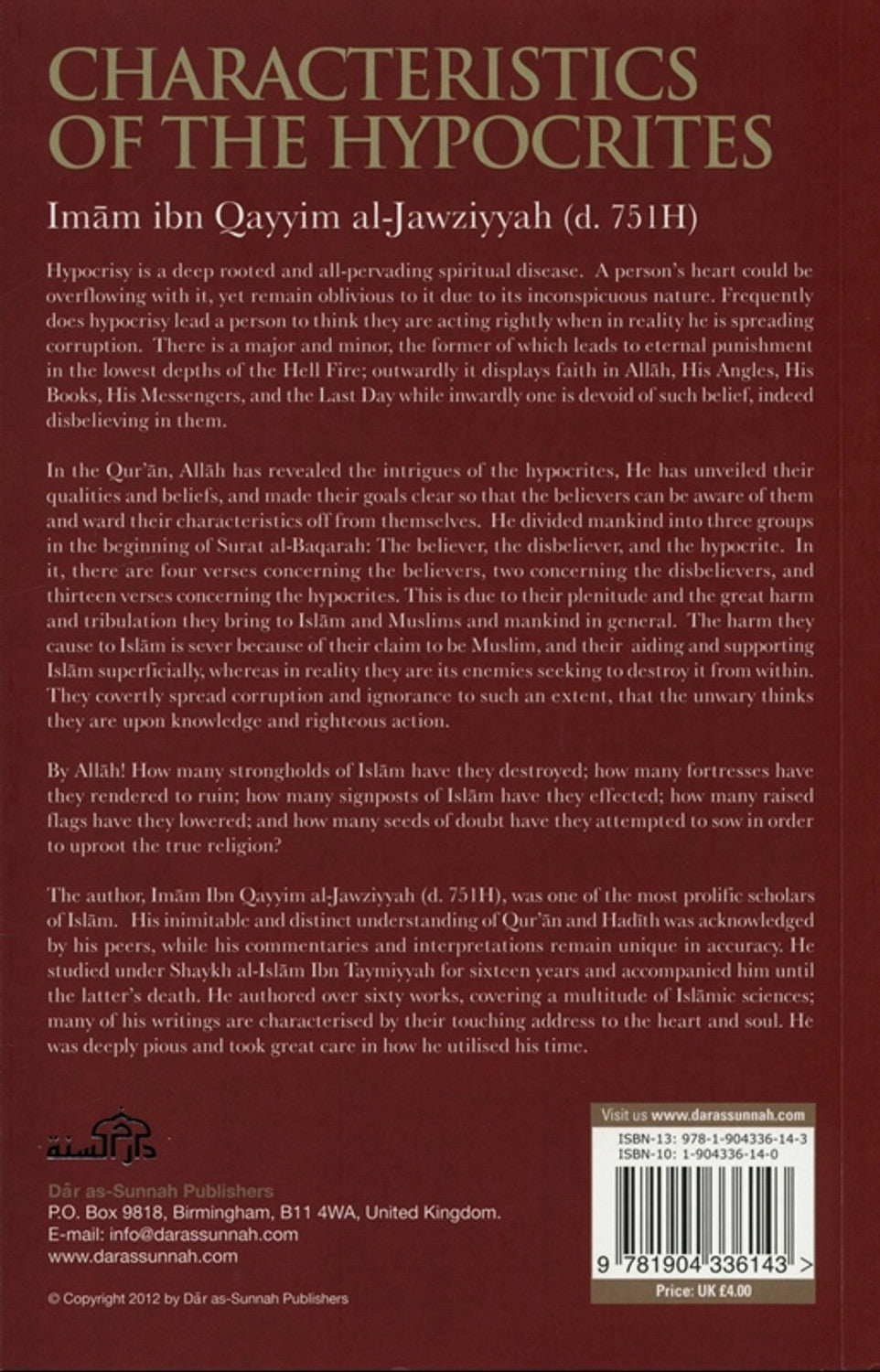Characteristics of the Hypocrites | Imam Ibn Qayyim al-Jawziyyah
Characteristics of the Hypocrites | Imam Ibn Qayyim al-Jawziyyah
Publisher:
Dar As Sunnah Publications
Author:
Imam Ibn Qayyim al-Jawziyyah
Language:
English
Binding:
Soft Cover
Pages: 80
Size: A5 |5.8 x 8.3 in| 14.8x 21 cm
Couldn't load pickup availability




Collapsible content
Description of Book
Hypocrisy is a spiritual illness that can greatly affect a person's actions and beliefs, while remaining hidden and unnoticed. It can lead someone to believe they are doing the right thing, when in reality they are causing chaos and corruption. This disease comes in two forms, major and minor, with the former leading to eternal punishment in Hell. The Quran warns against hypocrisy and reveals its true nature so that believers can be wary of it. In Surah al-Baqarah, Allah divides mankind into three groups: believers, disbelievers, and hypocrites. The harm caused by hypocrites, who claim to support Islam but secretly aim to destroy it, is immense. They destroy strongholds, ruins fortresses, and attempt to sow doubt in the minds of believers. Imam Ibn Qayyim al-Jawziyyah, one of the most prolific scholars of Islam, learned from Shaykh al-Islam Ibn Taymiyyah and authored over sixty works on various Islamic subjects. His writings
Publisher
Dar As Sunnah Publications
Author
- Imam Ibn Qayyim al-Jawziyyah
Sample Pages - Content
Page :01
DAR AS-SUNNAH CLASSIC COLLECTION CHARACTERISTICS OF THE HYPOCRITES Imām ibn Qayyim al-Jawziyyah (d. 751H)
Page : 02
Content Short Biography of Ibn al-Qayyim al-Jawziyyah His Name His Birth and Education His Teachers and Shaykhs His Manners and Worship His Students and Works 11 11 11 Statements of the Scholars about him His Death 2234K 12 12 13 14 16 Characteristics of the Hypocrites 18 Hypocrisy is a deep rooted and all-pervading spiritual disease 19 The characteristics of faith are not to be found in their hearts They treat the texts of the Book and Sunnah like Their capital is deception and scheming 23 23 Their lying 23 2222
Page : 03
Characteristics of the Hypocrites All praise and thanks are due to Allah, we praise Him, ask His aid, and ask His forgiveness. We take refuge with Allah from the evil of our souls and the evil of our deeds. Whoever Allah guides, none can misguide; and whoever Allah leaves to stray, none can guide. I bear witness that none has the right to be worshipped save Allah and I bear witness that Muḥammad is His servant and Messenger. يَأَيُّهَا الَّذِينَ ءَامَنُوا اتَّقُوا اللَّهَ حَقَّ تُقَانِهِ، وَلَا تَمُوتُنَّ إِلَّا وَأَنتُم مسْلِمُونَ ) You who have faith! Fear Allah as is truly due Him and do not die except as Muslims. [Ali Imran (3): 102 يَأَيُّهَا النَّاسُ اتَّقُوا رَبَّكُمُ الَّذِي خَلَقَكُم مِّن نَّفْسٍ وَاحِدَةٍ وَخَلَقَ مِنْهَا زَوْجَهَا وَبَثَّ مِنْهُمَا رِجَالًا كَثِيرًا وَنِسَاءً وَاتَّقُوا اللَّهَ الَّذِي تَسَاءَلُونَ بِهِ وَالْأَرْحَامَ إِنَّ اللَّهَ كَانَ عَلَيْكُمْ رَقِيبَا O mankind! Fear your Lord who created you from a single soul and created its mate from it and then dis- 18
Page : 04
CHARACTERISTICS OF THE HYPOCRITES Imam ibn Qayyim al-Jawziyyah (d. 751H) Hypocrisy is a deep rooted and all-pervading spiritual disease. A person's heart could be overflowing with it, yet remain oblivious to it due to its inconspicuous nature. Frequently does hypocrisy lead a person to think they are acting rightly when in reality he is spreading corruption. There is a major and minor, the former of which leads to eternal punishment in the lowest depths of the Hell Fire; outwardly it displays faith in Allah, His Angles, His Books, His Messengers, and the Last Day while inwardly one is devoid of such belief, indeed disbelieving in them. In the Qur'an, Allah has revealed the intrigues of the hypocrites, He has unveiled their qualities and beliefs, and made their goals clear so that the believers can be aware of them and ward their characteristics off from themselves. He divided mankind into three groups in the beginning of Surat al-Baqarah: The believer, the disbeliever, and the hypocrite. In it, there are four verses concerning the believers, two concerning the disbelievers, and thirteen verses concerning the hypocrites. This is due to their plenitude and the great harm and tribulation they bring to Islam and Muslims and mankind in general. The harm they cause to Islam is sever because of their claim to be Muslim, and their aiding and supporting Islam superficially, whereas in reality they are its enemies seeking to destroy it from within. They covertly spread corruption and ignorance to such an extent, that the unwary thinks they are upon knowledge and righteous action. By Allah! How many strongholds of Islam have they destroyed; how many fortresses have they rendered to ruin; how many signposts of Islam have they effected; how many raised flags have they lowered; and how many seeds of doubt have they attempted to sow in order to uproot the true religion? The author, Imam Ibn Qayyim al-Jawziyyah (d. 751H), was one of the most prolific scholars of Islam. His inimitable and distinct understanding of Qur'an and Hadith was acknowledged by his peers, while his commentaries and interpretations remain unique in accuracy. He studied under Shaykh al-Islam Ibn Taymiyyah for sixteen years and accompanied him until the latter's death. He authored over sixty works, covering a multitude of Islamic sciences; many of his writings are characterised by their touching address to the heart and soul. He was deeply pious and took great care in how he utilised his time. 線 Dár as-Sunnah Publishers P.O. Box 9818, Birmingham, B11 4WA, United Kingdom. E-mail: info@darassunnah.com www.darassunnah.com Copyright 2012 by Dár as-Sunnah Publishers Visit us www.darassunnah.com ISBN-13: 978-1-904336-14-3 ISBN-10: 1-904336-14-0 9 781904 336143> Price: UK £4.00
Imam Ibn Qayyim Al-Jawziyyah
A prominent medieval Islamic scholar, Ibn Qayyim’s works focus on spirituality, self-purification, and ethics. His influential writings, like "Madarij al-Salikin," continue to inspire Islamic thought and personal development.




